Martin Edwards's Blog, page 256
November 4, 2011
That Woman Opposite
Today - a forgotten film, based on a relatively forgotten book. I have John Curran to thank for recommending that I take a look at a 1957 black and white mystery movie, That Woman Opposite (the title seems very dated now, doesn't it?) I'd never heard of it before, nor did I realise that a John Dickson Carr novel had been adapted for film. The book was The Emperor's Snuffbox, which I haven't read, so I'm not sure if it's faithful to the original.
The cast is very good. Wilfred Hyde White, whom I always enjoyed watching, plays an old buffer who collects pricey antiques. His son is played by Jack Watling, who long ago starred in a TV series called The Plane Makers which I distantly recall my Dad watching avidly. And his daughter is played by...Petula Clark, whom I associate more with that great song 'Downtown'.
The old chap witnesses a crime committed by a bad hat (William Franklyn, best known for the Schweppes ads of the 60s) who is the ex-husband of a pretty woman who is engaged to the priggish son. An insurance investigator takes a shine to her, and we can bet that sooner or later she will succumb to his charm, even though she is about to marry. And then the old chap is murdered, and she becomes the prime suspect.
The story moves along at a decent pace, and although the mystery was more inconsequential than I'd expected (not a locked room in sight) I enjoyed it a lot. One of the better period pieces of its era, I'd say, and if you're looking for an agreeable piece of light entertainment, I'd recommend it to you, as John did to me.
November 2, 2011
The Devil's Priest lives again
Like most writers at present, I find my thoughts much occupied by ebooks. And I'm not the only one. Kate Ellis has used digital publishing to bring back to life her historical mystery The Devil's Priest. So I invited her to tell me, and us, more about it.
'History has always featured strongly in my Wesley Peterson novels, which are set in the modern day but always have an additional mystery from the past somewhere in the background. However, several years ago I wrote a novel set entirely in the sixteenth century during the reign of Henry VIII. As I was concentrating on Wesley and his heavy caseload at the time, it was taken on by a small publisher and a few years ago it went out of print, which was a pity because many of my readers told me they loved it…and even asked when I was going to make it into a series. Because I was busy with other projects, The Devil's Priest lay forgotten for a while…until the advent of the e-book revolution!
All my other novels have been issued as e-books but, as The Devil's Priest wasn't with a major publisher, it fell to me to arrange for it to be brought out on Kindle. My husband and my Systems Analyst son tackled the difficult technical stuff and now I'm very proud to see it there on Amazon, available to my readers at a bargain price.
Although I wrote The Devil's Priest some time ago I recall vividly how much I enjoyed carrying out the extensive research into life in Tudor Cheshire and Liverpool. The initial idea emerged from the history of my local church. Back in the 1530s, the Rector of Cheadle in Cheshire had a sister who was Abbess of Godstow in Oxford. Her name was Lady Katheryn Bulkeley and, as Abbess of a major religious house, she must have been one of the most powerful women in the land. In the course of my research I found letters written by her to Thomas Cromwell during the dissolution of the monasteries, in which she stood up for the rights of her abbey and her Sisters with a remarkable blend of tact and defiance. On the closure of Godstow Abbey this feisty woman came home to live with her brother in Cheshire where she died in 1559 and was buried in the chancel of the parish church where he was Rector.
With such a strong historical character so close at hand I couldn't resist giving her a mystery to solve so at the beginning of The Devil's Priest she receives word that one of her former novice nuns is facing deep trouble in the small port of Liverpool some forty miles away. Of course Lady Katheryn answers the desperate cry for help with dark and sinister consequences.
So, thanks to the development of e-books, readers can again enjoy Lady Katheryn's perilous investigation. And I hope everyone enjoys reading it as much as I enjoyed researching and writing it!'
October 31, 2011
Hidden and The Field of Blood - reviews
I've caught up with thefinal episode of Hidden, which I've reviewed here before, and also seen anotherrecent BBC TV crime show, The Field of Blood. The contrast between the two wasstriking.
Hidden first. It wasfull of action and plot developments, but it all became pretty incoherent. Asad waste of the talents of a cast that included David Suchet as well as thecharismatic Philip Glenister. Disappointing.
The Field of Blood,unlike Hidden, was not originally written for TV. It was a two-parter adaptedfrom a novel by a talented author, Denise Mina, though I haven't read it. Setin 1982, the story concerns a young woman, Paddy Meehan, who is keen to makeher way in journalism. The abduction andmurder of a young boy gives her a chance. But her own youthful cousin becomes asuspect.
The script was an oddmixture. There were some good lines, but the first episode was painfully slowat times, and there was a weird and monotonous insistence that Paddy was fatand plain. Jayd Johnson, who played Paddy, is certainly neither. And I alsofelt the repellent sexism of the newspapermen was rather unsubtly depicted.
But the pace picked up,and the second episode was excellent. David Morrissey and Peter Capaldi, inrelatively small parts for such notable actors, were very good, but JaydJohnson was at the centre of everything that worked best. And the story had some interesting thingsto say about families - also a theme of Hidden. The Field of Blood tried to do less than Hidden, but inthe end made much more of an impact.
October 27, 2011
Was Corinne's Murder Clued?
Was Corinne's Murder Clued? is the intriguing title of the latest CADs supplement, and it is written by Curtis Evans, whose knowledgeable comments will be familiar to readers of this blog. The idea of a supplement to CADS was editor Geoff Bradley's way of publishing pieces of work on crime fiction too lengthy to fit into the magazine itself. Previous authors of supplements include such experts as Barry Pike and Philip Scowcroft.
The sub-title of this supplement is "The Detection Club and Fair Play, 1930-1953" and I devoured it with great interest. Curt's idea was to explore how rigidly - or not - the Club stuck to its professed enthusiasm for "fair play" in clueing detective novels so that readers had a decent chance of figuring out the solutions for themselves. Not surprisingly, there isn't a straightforward answer, but perhaps many will be surprised by the care that Club members devoted to analysing the technical skills of prospective members. They did take it all pretty seriously.
Curt has - lucky man! - been able to read the correspondence of Dorothy L. Sayers with fellow Club members, held at Wheaton University in the US. He has - hard-working man! - noted with a scholar's scrupulous care a wide variety of comments made in the letters which cast interesting light on the personalities of the Club members. Suffice to say that Anthony Berkeley, whose books I so admire, doesn't come out of it all especially well. He was, undoubtedly, a man whose behaviour was a mass of contradictions.
Because this subject is one of great personal interest to me, I found this supplement absolutely fascinating. Would it appeal to others? I think so, because it's about a slice of literary history, not just as the product of very diligent research. For instance, I've wondered why an interesting writer like C.H.B. Kitchin was not a Club member. According to Curt, he was considered for membership, so perhaps he declined to join. The same seems to have happened with Georgette Heyer. There's no mention of Josephine Tey, but I speculate that the same was true in her case.
And finally, that title. It refers to a book by Douglas G. Browne which was dissected by Sayers and her colleagues as they wrestled with the question of whether Browne was worthy of Club membership. There was a lot of doubt about his account of poor Corinne's demise. But he was elected anyway. And I should add as a footnote that the current assistant secretary of the Club is also called Corinne. Which is why I did a double take the first time I saw the title of Curt's supplement! Suffice to say that I hope that his, and Geoff |Bradley's, enterprise attracts plenty of attention and purchases. They deserve it.
October 26, 2011
Independent bookshops
We all know thatindependent bookshops have been having a tough time for a number of years, buton Saturday, I had the encouraging experience of visiting two excellent indiesthat have not only survived the recession, but flourished.
After visitingLancaster and Kendal earlier in the day, I headed for Ambleside – home, atleast for the moment, to Hannah Scarlett – and Fred Holdsworth's nicely locatedshop, run by Steve with excellent support from knowledgeable assistants. Iremember calling in there one miserable January afternoon when I wasresearching The Serpent Pool, in which some of the action takes place inAmbleside.
Then it was a shortdrive through Wordsworth country to Grasmere, and Sam Read's shop, run by Elaine,again with keen staff support. Elaine and her husband then kindly invited us totheir house, just across the road, for a welcome cup of tea before the journeyback down the motorway to home.
Why have Steve andElaine succeeded when some the others have failed? There are bound to be acombination of reasons. Hard work and determination are musts. Both shops occupy good locations in lovely touristdestinations which don't possess a major chain store such as Waterstones. But there's more to itthan that. I was struck by the genuine love that Steve and Elaine have forbooks, and by the way they command the enthusiastic support of the people whowork for them. For any book buyer visiting either of these shops, there is sureto be a genuine welcome, and good deal of well-informed advice andrecommendations. And Steve and Elaine are prepared to innovate, sellingvarying lines from time to time, and showing the kind of enterprise thatmakes all the difference in a small business. An example is the postcards that Elainesells, from photographs (of very high quality) taken by her husband.
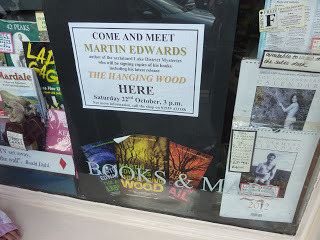
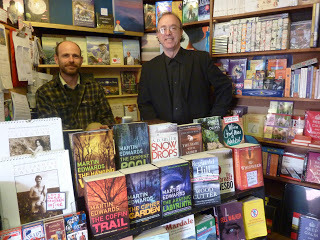 All in all, my trip leftme more hopeful about the future of well-managed bookshops and I have been fora long time. The economic climate present endless challenges, but there isstill room for really good retailers, and it was a pleasure to meet so many ofthem on Saturday.
All in all, my trip leftme more hopeful about the future of well-managed bookshops and I have been fora long time. The economic climate present endless challenges, but there isstill room for really good retailers, and it was a pleasure to meet so many ofthem on Saturday.October 25, 2011
Death in Paradise - BBC TV review
Death in Paradise is abrand new BBC TV detective drama with some interesting ingredients, and Isettled down to watch the first episode tonight with a good deal of optimism. Above all, Iwas intrigued by the fact that we were presented with – yes! – a 21st century locked room mystery.A sort of Guadeloupe-based homage to John Dickson Carr, if you can imagine sucha thing.
A British cop who isworking on a lovely little Caribbean island is found shot to death in a sealedpanic room belonging to a millionaire. The only two people with access to thepanic room are the millionaire and his wife, both of whom are conductingaffairs. But which of them is guilty?
Another British cop, DIPoole (no relation to Henry Wade's cop with the same name) is sent out toinvestigate. Poole is played by comedian Ben Miller, who is inexplicably grumpyabout being posted to a truly beautiful place. The casting gives a clue to thefact that this is a light-hearted drama, a contrast to the bleak and grittyshows that have become over-familiar on our screens.
The solution to themystery has a clever twist, and although this show is certainly not in the sameleague as early Jonathan Creek – which provided a masterclass in scriptwriting- I found it watchable. After all, givenmy enthusiasm for impossible crime stories, I'm naturally pleased to see thatthey are still finding favour with the TV programme makers. Admittedly, therewere various flaws in the script, and some of the humour seemed forced. Nor wasI really carried away by Miller's performance, which struck me as less than subtle. I can imagine that some viewers willhave been seriously unimpressed. But this was an establishing episode, with seven more tocome. As for making a definitive judgment on the show's quality, the jury is still out.
October 23, 2011
Waterstones
I had a very enjoyableSaturday, touring around a number of bookshops in, or just outside, the LakeDistrict. The trip had been arranged by my publishers, and I had the pleasureof signing plenty of books – which is always something an author enjoys! But aneven greater pleasure proved to be the chance to meet, and talk books with,quite a number of very likeable people.
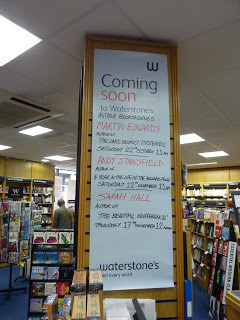
[image error]
The tour began inLancaster, a city I know reasonably well from many visits over the years. In fact,it was over a restaurant dinner in Lancaster that I had a conversation thatgave me the idea for the sub-plot of The Cipher Garden. This time I was callingat the Marketgate branch of Waterstones, where I had the chance to talk to bothreaders and members of staff, including Penny and Lynn.
Waterstones has changedover the years, and for quite a period of time it was difficult to avoid thefeeling that there was heavy emphasis on bestsellers and "three-for-the-price-of-two"offers. Mid-list writers like me, who were given great support by Waterstonesfor many years, found it increasingly difficult to feature on the shelves. Butthings seem to be taking a real change for the better, following the change inownership of the company. The impression I have is that the people at the topare taking the business in a new direction, not necessarily trying to competesimply on price with Amazon – which strikes me as a losing battle – butoffering a crucial personal ingredient in bookselling with enthusiastic andknowledgeable staff. I'm sure that this is the right way to go from a businessperspective, and it also makes Waterstones increasingly attractive to bookbuyers. I'm not saying the price isn't important, especially in tough economictimes, but it is not the only factor that matters.
Then it was onto Kendal,one of my favourite northern towns, and one which features regularly in theLake District Mysteries. Once again, the local Waterstones featuredknowledgeable and – so very important – enthusiastic staff, managed byCaroline, who is clearly a real book lover. We all know that things aredifficult in the retail sector these days, and staff who have a genuine passionfor the products they sell are the key to making a success of any retailbusiness in competing with online stores. Amazon reviews and ratings havebecome really important for writers – perhaps disproportionately so – but there'sno doubt that word-of-mouth recommendation from readers and booksellers remainsenormously valuable.
All in all, I wasgreatly heartened by these visits to Waterstones, not just from a personalperspective, but more generally as a book fan. And after that, it was on to twoindependent bookstores of great appeal – more about them soon.
October 20, 2011
Forgotten Book - The Crooked Hinge
My Forgotten Book for today is another novel written by John Dickson Carr in his prime, The Crooked Hinge, first published in 1938 and dedicated to Dorothy L. Sayers 'in friendship and esteem'. It features Dr Gideon Fell, who is pretty much on top form.
The starting point is an impersonation riddle reminiscent of the case of the Tichborne Claimant. Sir John Farnleigh, recently returned to his home to claim his inheritance, has married his childhood sweetheart - but someone else has come forward, claiming that Farnleigh is an impostor and that he, Patrick Gore, is the real Farnleigh.
The cleverness of the mystery is that when murder occurs, the victim is unexpected – he is the 'original ' John Farnleigh. How was he killed, and who was responsible? The claimant seems to be in the clear, but can we be sure? Carr rings the changes on the list of suspects with his usual ingenuity, and the atmosphere darkens as Satanism makes its presence felt in the story.
Dr Fell propounds an apparently brilliant solution – but it emerges that this is simply a device on his part to expose the principal culprit. I thought this use of the 'alternative solution' type of plot was very well done, and although the book sagged a bit in the middle, on balance I found it highly enjoyable. Definitely worth reading, a book that should not be forgotten.
October 18, 2011
The Oxford Mysteries
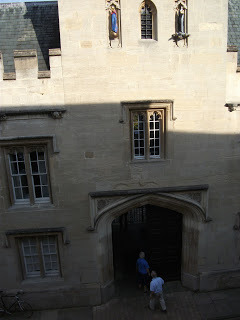
[image error]
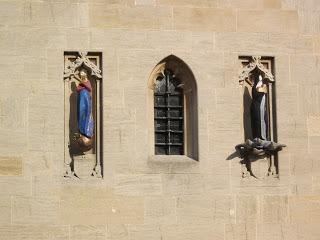


It's been a lousy summer in Britain, but of course there have been some exceptional days, and two of the last three Saturdays have been terrific. Last Saturday I walked in the sun around a relatively unfrequented part of the Lakes - gorgeous. And a fortnight earlier, it was baking hot in Oxford, quite amazingly so for early October, as I set about installing my children and their countless belongings in their college rooms.
Oxford was full of life, and I found myself wondering why it is that fictional death in the city has featured so often when compared to Cambridge. The Oxford crime mystery got going in the 30s, with books like J.C. Masterman's An Oxford Tragedy (a pretty good one I shall talk about in more detail one day). Michael Innes and Edmund Crispin set plenty of stories there, and then in the modern era Colin Dexter made the place his own.
But there have been plenty of other Oxford mysteries. I have in my TBR pile a book called The Body in the Turl, which I really must read now my daughter lives in Turl Street. And I was once responsible for a short story set in 19th century Oxford - 'The Mind of the Master'. Benjamin Jowett was my choice as a legendary armchair detective, and I did contemplate writing a whole series of stories about him. But I've never got round to it. One day, perhaps.
As for the photos, they show some of the views that greet the young Edwardses when they finally get round to opening the curtains in their college rooms. Lucky things.
October 16, 2011
Research
I've found it a struggle to get started with the next Lake District Mystery. Lack of time is an easy excuse, but it isn't really good enough. I did write a first chapter, but it didn't live up to my ambitions, so I've binned it, retaining only the opening line.
So - how to get going? I decided I really needed to soak myself in the locale, and luckily last Saturday was sunny enough to allow me to do just that. The result was a walk that was hugely enjoyable, with magnificent views. Here are some photos of the area where I'll be setting the book.
[image error]
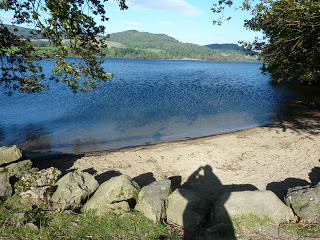
[image error]




 If that doesn't inspire me through the winter, I don't know what will!
If that doesn't inspire me through the winter, I don't know what will!


